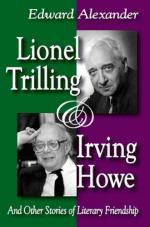|
This section contains 5,260 words (approx. 18 pages at 300 words per page) |

|
SOURCE: "Lost Causes/Marginal Hopes: The Collected Elegies of Irving Howe," in The Virginia Quarterly Review, Vol. 65, No. 2, Spring, 1989, pp. 215-30.
Pinsker is an American educator and critic who has written extensively on Jewish-American literature. In the essay below, he presents an overview of the recurring themes in Howe's writings.
God died in the nineteenth century, utopia in the twentieth.
—from Irving Howe's A Margin of Hope.
At one point in A Margin of Hope (1982), Irving Howe's intellectual autobiography, he speaks of himself as "moving closer to the secular Yiddish milieu at the very moment it was completing its decline"—and then he wonders, almost as an afterthought, if this newfound passion is not perhaps "Another lost cause added to my collection." Such candor on Howe's part has hardly been in short supply; indeed, it is precisely this ability to look upon both the world and the Self...
|
This section contains 5,260 words (approx. 18 pages at 300 words per page) |

|


